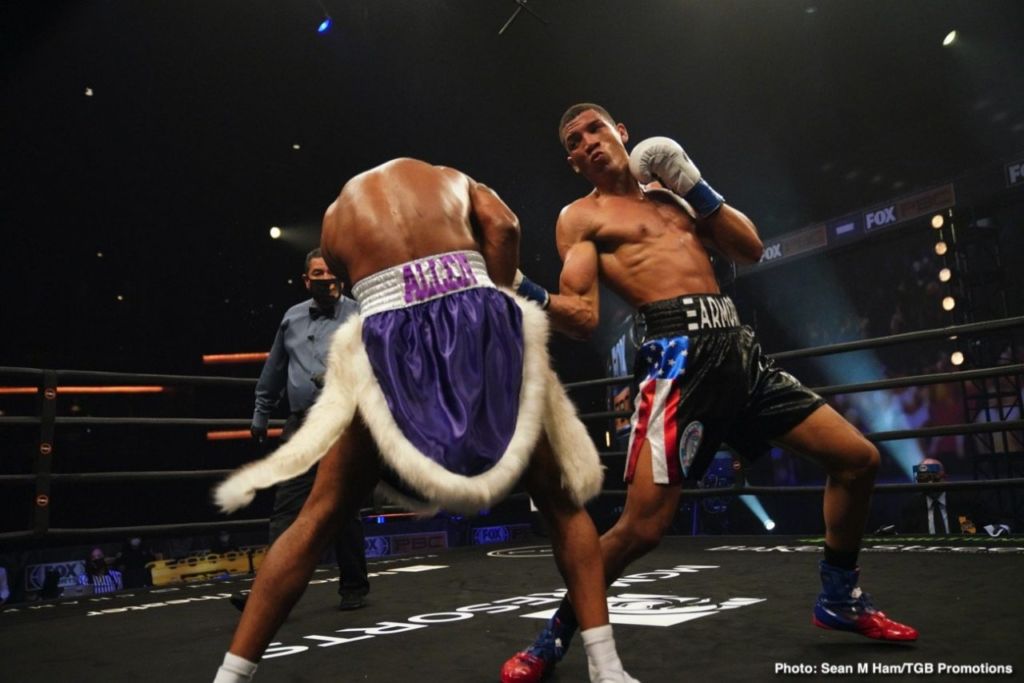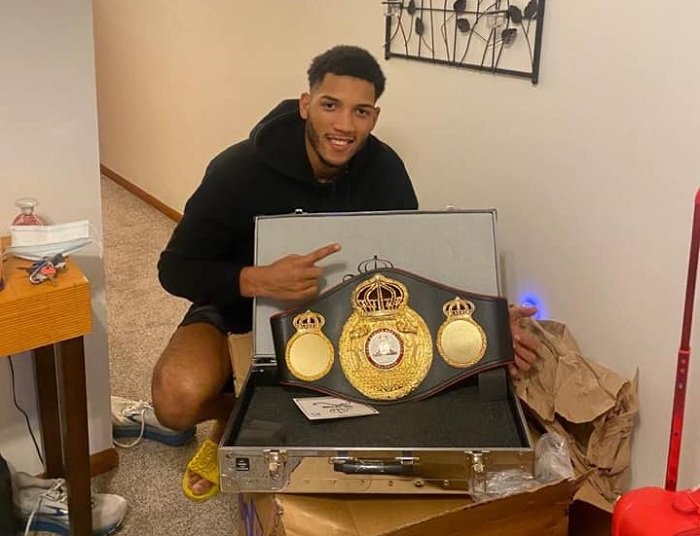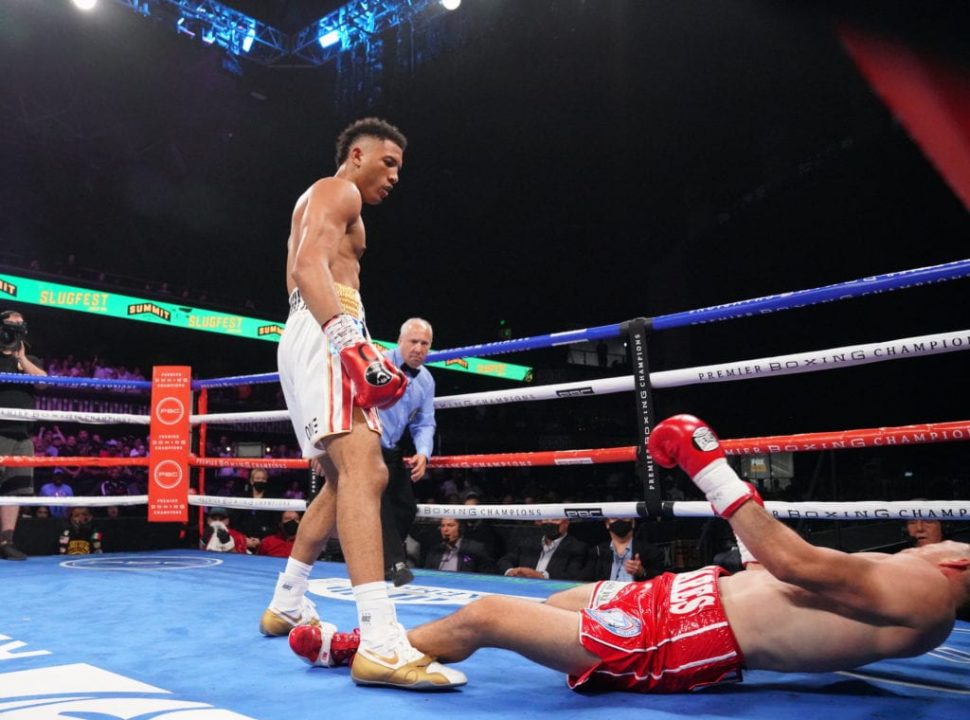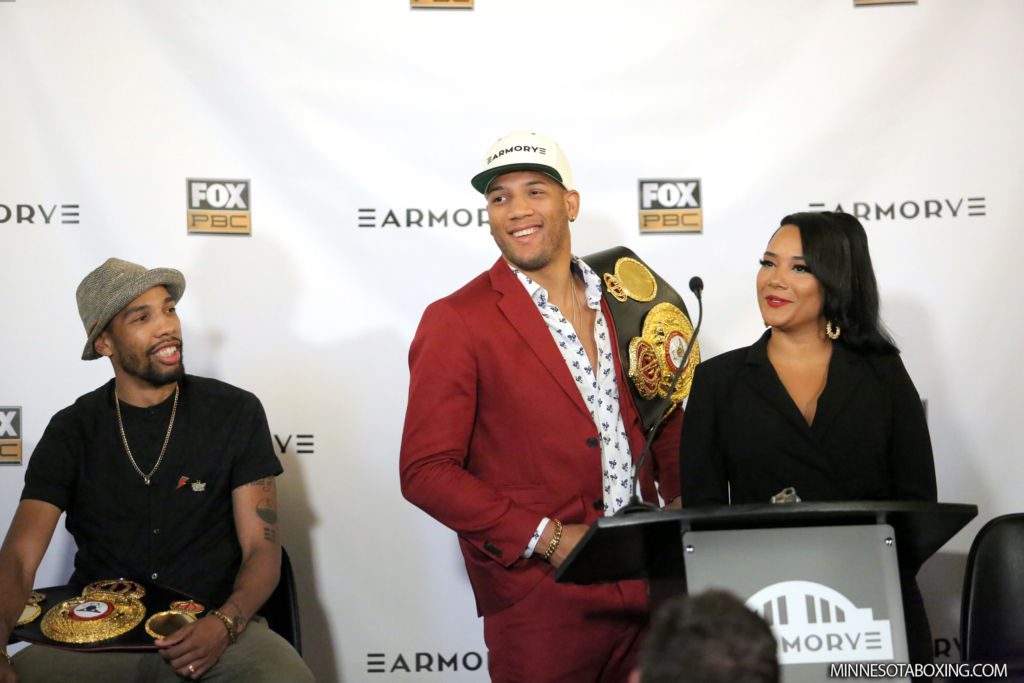Boxer David Morrell, Jr. Has Always Defied the Odds, Whether Running for His Life or Fighting For His Title

BY RAY KILGORE. Cuba is nearing a crisis. Two weeks ago, thousands of Cubans from all over the world protested defiantly, giving voice to their outrage over their perception of their government officials’ refusal to address the dismal conditions in the country. “We want freedom,” and “We are no longer afraid,” the protesters shouted.
Cuban residents are at risk for ongoing illness caused by issues such as contaminated water and mosquito-borne diseases. And the data in recent reports from Cuba’s health authorities are alarming. It shows 7,000 new cases of illness and 47 deaths due to health issues alone.
Although 168-pounder and current interim WBA world champion David Morrell Jr. defected from Cuba long before the recent protests, he wasn’t immune to the country’s problems while growing up.
“Initially, when I was a kid, things were easier to overcome,” he said. “But as I got older, things became more difficult for my family and me. As you get older, you start getting conscious about your family and what really matters.”
As a teenager, Morrell Jr. experienced the merry-go-round that many Cubans endure: ups and downs that always end in the same oppressive destination.
“In Cuba, if you are not a lucky person or are an extraordinary boxer and combined with luck, it’s very hard to want to be anything to help your family out,” he said. “It’s unfortunate because there is a lot of talent in Cuba, but either you leave or stay and let go of any dreams. So that’s the battle every day: Do I leave my family and become my best version, or do I stay and waste my talent, and that happens a lot.”
So, Morrell Jr. joined 16 other defectors, mostly strangers, who formed a tight-knit community. At 6:00 a.m. on June 3, 2018, Morrell Jr. and the other defectors had to swim for 16 meters, their arms and legs moving similar to that of a high-speed chase. “It was very difficult,” he said.
“The tide was high, and you couldn’t see anything. We were swimming, and the waves were hitting us. It was scary. Frightening is an understatement; it makes someone question if there’s such a thing as faith in humanity.”
Morrell Jr. and the other defectors made it through the first phase of what they hoped was a journey to freedom. However, this was just the beginning. “We had to submerge ourselves in the woods. We were basically there for hours in the Cuba jungle for a whole day,” he said. “From the time I got there [the jungle].”
But resiliency in the face of adversity wasn’t anything new. Morrell Jr took up boxing at age nine. And by the time his illustrious amateur career ended, he had a dazzling record of 135 wins against 2 defeats. He knew that to be successful, he would have to feel the fear and do it anyway.

On June 4, Morrell Jr., and the 16 other defectors, including his father and older brother, received the signal that the boat responsible for getting them to the next phase was nearby.
Once again, the defectors swam. “It was hectic; we were trying to get on the boat, and it was slippery,” said Morrell, Jr. Nevertheless, they made it.
It’s difficult to blame the boxer had he closed his eyes in a sigh of relief. But even if Morrell Jr. had taken advantage of such a moment, it wouldn’t have lasted long given what he noticed immediately.
“I asked my brother, ‘Hey, where’s dad? I haven’t seen him,’” Morrell Jr. recalled. “As I am asking my brother, I go to the back of the boat (it was pitch dark) and…could hear my dad still in the water. I go to extend my hand, but we see the coast guard, and automatically the boat had to leave; we couldn’t wait.”
He went on: “I was going to dive and get my father, but my brother and three other people held me down, basically telling me it was too late.”
Morrell Jr. listened to his father’s voice trail off as the boat’s driver sped off in response to the increased danger. Distressed and devastated, the fighter, now 23, accepted that his efforts would have been futile to help his father.
The boat made it to the next phase. Once again, the defectors swam until they reached their destination of Mexico’s Yucatan Peninsula.
During that time, Morrell Jr. said he and the other defectors were stationed at a house for six months until there were talks that things were not going right. In other words, Law Enforcement Customs were in pursuit. In fact, in 2016, 64 Cubans were deported back from the USA. And by 2018, the number increased to 463.
After hearing the rumbling of trouble, Morrell Jr. frantically gathered whatever belongings were within his reach and exited the property with the other defectors. They were moved to a new location for another six months.
“The only thing that kept me sane and mentally well was the hope to see my family and help my family,” he said. “And that I had to take that position to move forward, and there was no looking back. I had to push through and keep going. And even if I wanted to, I couldn’t look back.”
Finally, on July 5, 2019, Morrell Jr. entered the USA and became a citizen; he lived in Miami for a bit before connecting with boxing promoter Luis de Cubas, who helped Morrell Jr. find his new home in Minneapolis, Minnesota.
Life now for Morrell Jr. (outside of boxing) has him lounging and playing his PlayStation, hanging out with his girlfriend Anna, shooting the breeze with friends, and staying in daily contact with family in Cuba.
Throughout the two years that Morrell Jr’s. life was in shambles while on the run, he never lost focus on boxing; he stayed in shape, shadowboxed, and visualized what life would look like once he returned to boxing as a competitor. In August 2019, his curiosity was put to rest.
“I was very nervous for the fight,” he recalled, thinking about his professional debut. “Out of the five fights, his current record is (5-0 (4 KOs); that was the most nerve-wracking for me.”
Thankfully, his opponent played his part as a sacrificial lamb. The fight went something like this: hello, lights out, game over.
In Morrell, Jr.’s last three fights, his combined opponents’ records were 56 wins against 3 defeats. But it was Morrell Jr’s shocking performance against Lenox Allen (22-0-1, 14 KOs) who was at that time considered the number one contender in the world.
Morrell Jr. went into the fight with a record of (2-0, 2 KOs) and dominated Allen without controversy and picked up the world title, something no Minnesota fighter has ever done with two victories.

And last month, Morrell destroyed Mario Abel Cazares who was (12-0, 5 KOs) in round one to defend the title. Morrell Jr.’s one-sided whipping of Cazares brought in the second-highest viewership on Premier Boxing Champions’ national TV. “I didn’t expect that,” Morrell Jr. said. “I am happy it makes me an inspiration to Minnesota boxers.”
In terms of viewership, the only fight to outdo Morrell-Cazares was former IBF champion Caleb Truax, a Minnesota boxer, who came up short against current world champion Caleb Plant earlier this year.
As for future local fights, Morrell Jr.’s options are not promising, outside of Truax, who fights in the same division. Truax isn’t on Morrell Jr’s radar, but should the fight present itself, Morrell Jr. would seize the opportunity. “I think it will be great for a good old Minnesota fight night for the people here in Minnesota,” he said.
Minnesota fighters have a long tradition of being unfairly disrespected and stigmatized in the boxing world. And the reality for Morrell Jr. is that at some point, he will fall into the same category: dammed if he does and damned if he doesn’t. But Morrell takes it all in stride and has no regrets about coming to Minneapolis.
“Those other places [cities outside of Minnesota] had many Cubans, but here, there wasn’t, and it made my choice easier,” he said.
However, his goals are much bigger than being label a Minnesota boxer. “I not only want to get to where all champions are, but I want to be a legend in boxing. I don’t have any other focus.”

Even if Morrell Jr., tried to go along with the status quo, it would never work. “We all struggle a little different, and coming from Cuba, we struggled a lot,” he said. “Use that strength and energy to be that much better… feed that hunger and use it for the better,” he said. “To become stronger…and use that struggle for motivation to keep fighting.
